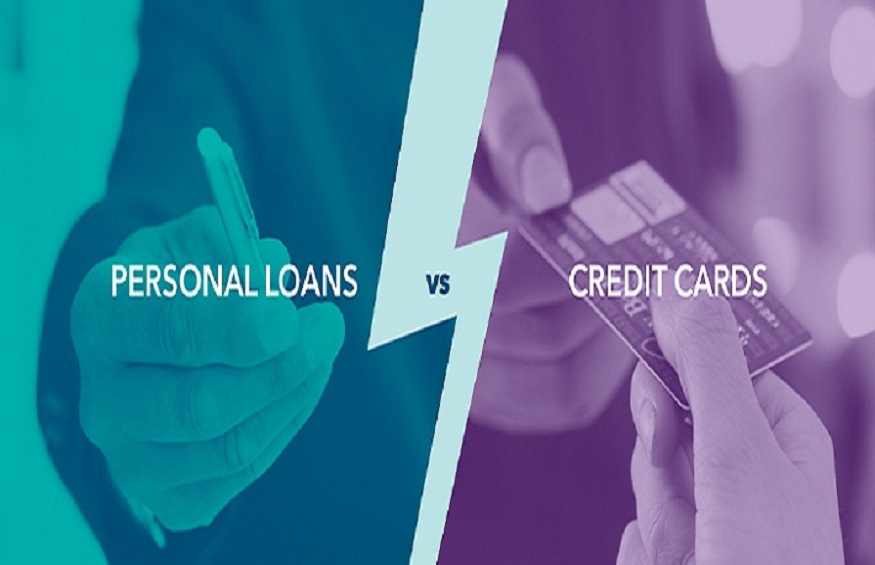Here’s A Detailed Analysis Between Personal Loans& Credit Card

Both credit cards and personal loans are useful debt instruments that can help you to meet your financial obligations. Whether to opt for a personal loan or a credit card has been an evergoing debate. Both these debt instruments come with unique features that make them a great choice in different situations. An instant cash loancan serve you best when you want a flexible repayment tenure. While a credit card is best suited for handling monthly expenses that you can repay before the due date.
Also, a personal loan or salary loan is credited into your account and you can use the loan amount in any way, including withdrawal of cash. However, a credit card may see some limitations in terms of end-use. Thus, you should choose between a credit card loan and an instant cash loan only after considering your borrowing needs and ability to repay. Each has its own set of benefits and drawbacks.
Read on to discover a detailed analysis between a personal loan and a credit card.
Difference between Personal Loan and Credit Card Loan
A personal loan is an unsecured loan offered by financial institutions based on several factors, including credit history, employment history, repayment capacity, income level, and profession. For example, a salary loan is a personal loan against salary that salaried people can use to meet their needs. This can include an unexpected medical bill, a child’s higher education costs, home improvement costs, travel or wedding expenses, etc.
When you require small loans with a short term, a credit card loan is a better choice. It is the best choice for making online or offline purchases like buying electronics, or other lifestyle products. You can also swipe your credit card to pay for gasor restaurant bills. Many credit card offers discounts or reward points for such usage. However, while swiping your credit card, you must keep in mind that you should be able to repay this amount in full before the due date to avoid paying interest.
Here are some of the stark differences between a personal loan and a credit card –
1. Loan Amount
Financial institutions often offer personal loans from 50,000 to 25 lakh rupees. However, factors such as credit score, monthly income, employment history, etc., will affect the loan amount. Lenders also prefer borrowers who maintain their overall EMI obligations at 40% or less of their monthly income. A personal loan is also given to salaried people in the form of a salary loan or a short-term loan, and the application process is relatively quick.
When it comes to credit cards, the issuers determine each cardholder’s credit limit based on their monthly income and credit score. Cardholders can swipe or take a loan against a credit card up to the defined limit. Some lenders also offer a special form of loan against credit cards, in addition to the cardholder’s credit limit.
2. Time of disbursal
These days, instant cash loansapplied online are typically disbursed within 24 to 48 hours. However, this also depends on your location, lender and documentation. You must submit all the necessary documents as requested by the lender to receive quick disbursal of funds.
While a credit card is ready to use as and when you need it, but applying for a credit card and receiving the card at your doorstep may take days. Many credit card providers run strict verifications, including physical verification, before approving your credit card.
3. Interest rate and fees
Personal loan interest rates can range from 11-24% annually, based on the loan amount, monthly income, loan tenure, employment and the lender. While using a credit card to pay for purchases is free as long as the balance is paid by the due date, keeping an unpaid balance results in costly finance charges of up to 47% each year.
Processing fees for personal loans can range from 0-2.5% of the loan amount. Credit card swipes are free of processing fees, but there might be an annual maintenance charge on your credit card.
4. Repayment tenure
Compared to personal loans, which typically have terms of 12 to 60 months, a credit card is a revolving debt with no set repayment period. The repayment duration can, however, be between three and 60 months in the event of EMI conversion. Likewise, the loan tenure for a credit card loan usually ranges between 6 months tofive years.
While some lenders do not charge fees for early repayment of personal loans, most charge between two and five percent of the outstanding balance. Also, some lenders only permit prepayment of personal loans once a particular number of EMIs have been repaid.Credit cardsdo not have pre-payment penalties and you can pay your credit card bill as and when you have the funds.
Conclusion
Both credit cards, as well as a personal loan, are very useful debt tools that can come to your aid in different situations. You must know the pros and cons of both to make the right choice between the two. If simply said, a credit card is best suited for making payments that you can repay within the billing cycle. A personal loan or salary loanis your best choice when you want a longer tenure and higher flexibility in terms of end-use.
However, for both these credit tools you must maintain a high credit score and have a solid repayment plan. You should also be very prudent while using these debt tools as reckless behaviour can lead you into a debt trap.







Very interesting topic, appreciate it for posting.Blog money